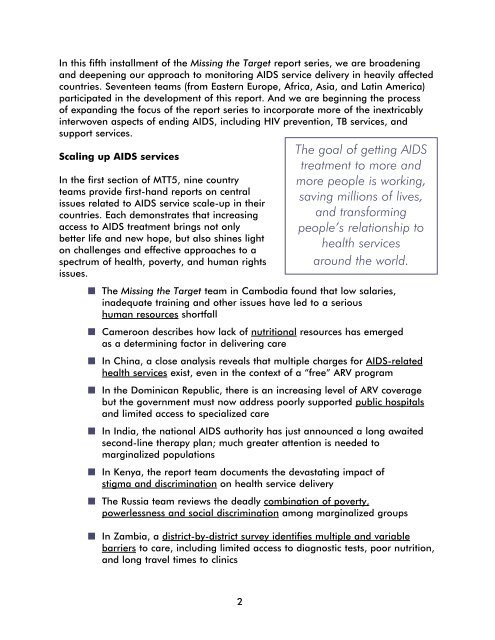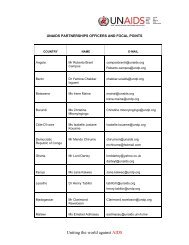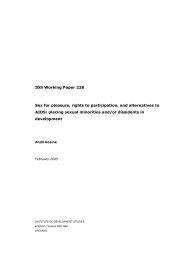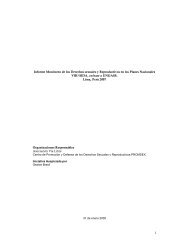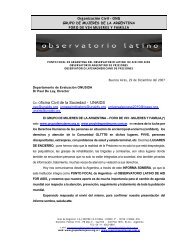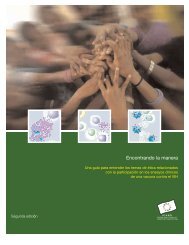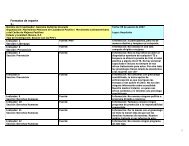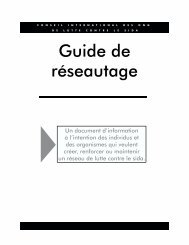Executive SummaryAt <strong>the</strong> G8 meeting in Gleneagles in 2005 and again at <strong>the</strong> United NationsUNGASS session in 2006, world leaders promised to come as close as possible toproviding universal access to <strong>AIDS</strong> treatment and prevention by 2010. Estimates ofHIV incidence and prevalence will change, but by any account, today several millionpeople in desperate need of <strong>AIDS</strong> treatment do not have access to it. And at <strong>the</strong>current pace of growth in treatment delivery, several million will not have access by<strong>the</strong> end of 2010. Broken promises will mean millions of deaths.Scale up of <strong>AIDS</strong> treatment is driving unprecedented expansion of health deliveryand, in <strong>the</strong> process, identifying critical challenges to health systems as well aspractical solutions to address <strong>the</strong>m. This report identifies many ways in whichgovernments and global agencies must act to correct systems essential to deliveryof health. In <strong>the</strong> area of antiretroviral drug access—a special focus of this report—our research found that in many countries drug registration, procurement, andsupply management systems are inadequate, drug stock-outs are common, andmost people are not being treated with ARV regimens that are consistent withrecent WHO recommendations for improved first-line and standardized second-linetreatment combinations.On-<strong>the</strong>-ground research by civil society advocates from 17 countries also reveals<strong>the</strong> close interconnection of <strong>AIDS</strong> services with o<strong>the</strong>r health and social supports.The lessons for successful <strong>AIDS</strong> treatment are true for all health services:appropriate delivery includes adequate nutrition, clean water, trained healthworkers, accessible health clinics, integration of prevention and treatment, andfree provision of drugs, diagnostic and monitoring tests, and o<strong>the</strong>r commodities.Mobilization around <strong>AIDS</strong> has raised new resources, built consumer-engagementin providing health care, marshaled enduring public support, and promoted <strong>the</strong>development of results-oriented approaches to global health. Building on <strong>the</strong>sefoundations should be a central strategy in developing comprehensive systems ofhealth care. In Haiti and Rwanda, for example, providers are demonstrating howto deliver <strong>AIDS</strong> treatment as part of a comprehensive program that includes HIVprevention and a wide range of health services. 1 2 3We cannot allow responses to <strong>AIDS</strong> and o<strong>the</strong>r chronic health issues to becomebogged down in simplistic dichotomies: prevention vs. treatment; horizontal vs.vertical programming; disease-specific funding vs. strong health systems. There isonly one appropriate approach: We must do everything, better, for more people,and in an increasingly coherent way.1 Global Fund to Fight <strong>AIDS</strong>, Tuberculosis and Malaria. Partners in Impact: Results Report. 2007: 36.http://80.80.227.97/en/files/about/replenishment/oslo/Progress%20Report.pdf2 Farmer, P, From “Marvelous Momentum” to Health Care for All, January 23, 2007,www.foreignaffairs.org/special/global_health/farmer3 Partners in Health. Rwanda scales up PIH model as national rural health system. October 2007.www.pih.org/inforesources/news/Rwanda_Scale-up.html1
In this fifth installment of <strong>the</strong> <strong>Missing</strong> <strong>the</strong> <strong>Target</strong> report series, we are broadeningand deepening our approach to monitoring <strong>AIDS</strong> service delivery in heavily affectedcountries. Seventeen teams (from Eastern Europe, Africa, Asia, and Latin America)participated in <strong>the</strong> development of this report. And we are beginning <strong>the</strong> processof expanding <strong>the</strong> focus of <strong>the</strong> report series to incorporate more of <strong>the</strong> inextricablyinterwoven aspects of ending <strong>AIDS</strong>, including HIV prevention, TB services, andsupport services.Scaling up <strong>AIDS</strong> servicesIn <strong>the</strong> first section of MTT5, nine countryteams provide first-hand reports on centralissues related to <strong>AIDS</strong> service scale-up in <strong>the</strong>ircountries. Each demonstrates that increasingaccess to <strong>AIDS</strong> treatment brings not onlybetter life and new hope, but also shines lighton challenges and effective approaches to aspectrum of health, poverty, and human rightsissues.The goal of getting <strong>AIDS</strong>treatment to more andmore people is working,saving millions of lives,and transformingpeople’s relationship tohealth servicesaround <strong>the</strong> world.The <strong>Missing</strong> <strong>the</strong> <strong>Target</strong> team in Cambodia found that low salaries,inadequate training and o<strong>the</strong>r issues have led to a serioushuman resources shortfallCameroon describes how lack of nutritional resources has emergedas a determining factor in delivering careIn China, a close analysis reveals that multiple charges for <strong>AIDS</strong>-relatedhealth services exist, even in <strong>the</strong> context of a “free” ARV programIn <strong>the</strong> Dominican Republic, <strong>the</strong>re is an increasing level of ARV coveragebut <strong>the</strong> government must now address poorly supported public hospitalsand limited access to specialized careIn India, <strong>the</strong> national <strong>AIDS</strong> authority has just announced a long awaitedsecond-line <strong>the</strong>rapy plan; much greater attention is needed tomarginalized populationsIn Kenya, <strong>the</strong> report team documents <strong>the</strong> devastating impact ofstigma and discrimination on health service deliveryThe Russia team reviews <strong>the</strong> deadly combination of poverty,powerlessness and social discrimination among marginalized groupsIn Zambia, a district-by-district survey identifies multiple and variablebarriers to care, including limited access to diagnostic tests, poor nutrition,and long travel times to clinics2
- Page 1 and 2: Missing the Target #5:Improving AID
- Page 4 and 5: ArgentinaDr. María Lorena Di Giano
- Page 12: • UN agencies should provide incr
- Page 16 and 17: Price should not be a barrier when
- Page 18 and 19: The Global Fund and UNITAID: The Fu
- Page 20 and 21: The real cost of free treatmentBy a
- Page 22 and 23: Remaining work for asuccessful prog
- Page 24 and 25: DOMINICAN REPUBLICto access rapid t
- Page 26 and 27: DOMINICAN REPUBLICIn Santo Domingo
- Page 28 and 29: ZIMBABWEtreatment, representing 35
- Page 30 and 31: ZIMBABWEAccording to the Medicines
- Page 32 and 33: ZIMBABWEZimbabwe’s application fo
- Page 34 and 35: ZIMBABWENational government• Addr
- Page 36 and 37: RUSSIAMigrantsRussia, with the seco
- Page 38 and 39: a person with HIV will die very qui
- Page 40 and 41: FamiliesIn Kenya, families are the
- Page 42 and 43: INDIA2. Provide pediatric formulati
- Page 44 and 45: Linking nutrition and treatmentBy W
- Page 46 and 47: Most people living with advanced HI
- Page 48 and 49: only available in the capital, Yaou
- Page 50 and 51: ZAMBIAFindings in particular provin
- Page 52 and 53: The DACA for Chadiza District was a
- Page 54 and 55: Many health care workers are inadeq
- Page 56 and 57:
DRUG REGISTRATION BARRIERS & LOGJAM
- Page 58 and 59:
Country ATV RLPV/rLPV/r(HS)TDFArgen
- Page 60 and 61:
development and registration. Likew
- Page 62 and 63:
Capacity issues and delays in the W
- Page 64 and 65:
Lack of post-approval quality assur
- Page 66 and 67:
ARV PROCUREMENT, REGISTRATION,AND S
- Page 68 and 69:
ARGENTINAParallel importingRelating
- Page 70 and 71:
ARGENTINAAccess to ARVsNo difficult
- Page 72 and 73:
Viral load tests are available, but
- Page 74 and 75:
Cambodiaby Mony PenOnly pharmacists
- Page 76 and 77:
ChinaBy anonymous Missing the Targe
- Page 78 and 79:
CHINAThe current process for regist
- Page 80 and 81:
Dominican RepublicBy Eugene Schiff
- Page 82 and 83:
IndiaBy Abraham KK, Celina D’Cost
- Page 84 and 85:
MalawiBy Lot Nyirenda and Grace Bon
- Page 86 and 87:
MALAWIStock-outsAccording to an ext
- Page 88 and 89:
MoroccoBy Othman MelloukMorocco has
- Page 90 and 91:
Determine the patent status of all
- Page 92 and 93:
MOROCCOThe shortage occurred becaus
- Page 94 and 95:
As of November 2007, the unit cost
- Page 96 and 97:
NIGERIADiagnostic testsDiagnostic t
- Page 98 and 99:
The government’s initial inabilit
- Page 100 and 101:
Increase training and capacity buil
- Page 102 and 103:
treatment practice. The Minster ann
- Page 104 and 105:
Ugandaby Richard Hasunira, Prima Ka
- Page 106 and 107:
UGANDAExtracts from the MoH’s rep
- Page 108 and 109:
ZAMBIAIn gathering this information
- Page 110 and 111:
However, since manufacturing prices
- Page 112 and 113:
105SHORT SUMMARY
- Page 114:
PAKISTANAccess for marginalized gro


